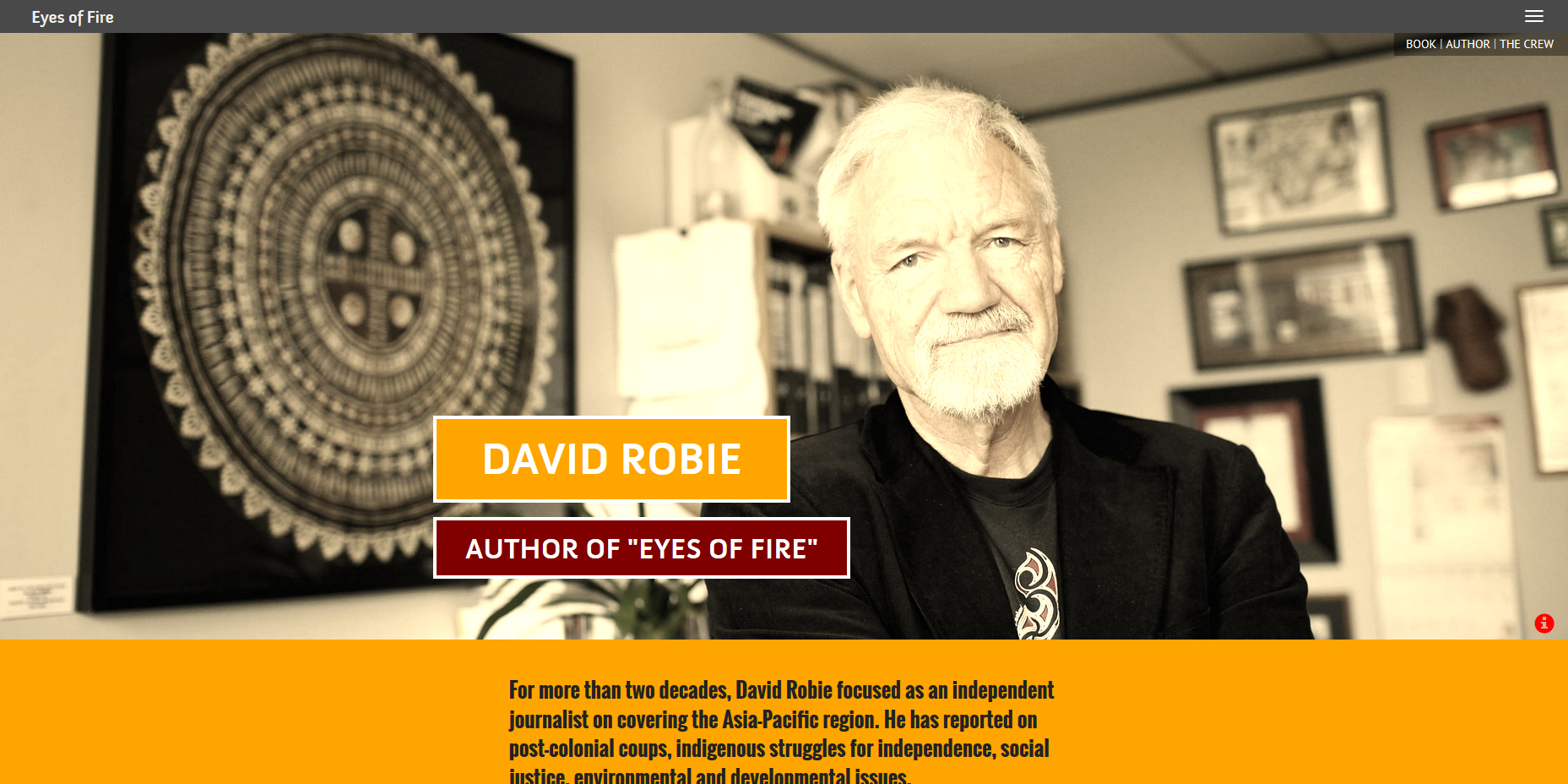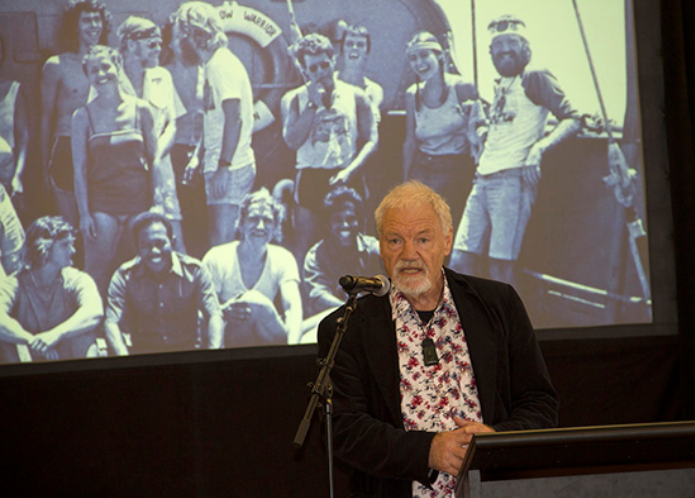New Zealand journalist and media educator David Robie returns with two books commemorating the sinking of Greenpeace’s iconic campaign ship and the nuclear-free Pacific movement. Ed Rampell reports from the US.
SPECIAL REPORT: By Ed Rampell
Thirty years ago today French secret agents blew up Greenpeace’s Rainbow Warrior in nuclear-free New Zealand. The covert action, code-named Opération Satanique (Operation Satanic), sank the 40m ship in Auckland Harbour, killing 35-year-old Portuguese photographer Fernando Pereira and leaving his eight-year-old daughter Marelle fatherless.
The goal of the 10 July 1985 attack was to stop Greenpeace’s flagship vessel from sailing to Moruroa atoll and joining a peace flotilla of New Zealanders and Tahitians to protest at France’s South Pacific nuclear test site.
Since the 1970s, Dr Robie has arguably been to the nuclear-free and independent Pacific movement what John Reed, author of Ten Days That Shook the World, was to the Russian Revolution. Wherever Pacific Islanders have defended their rights and environment, the intrepid island-hopper has been there to report.
Now that he is 70, the hard-hitting journalist and media educator is taking a reflective look back at a career spent on the frontlines of the anti-colonial, anti-nuclear, eco-struggles of Oceania’s indigenous peoples in two recently released books.
To commemorate the 30th anniversary of the Rainbow Warrior’s demise, Auckland-based Little Island Press has published the fifth edition of Robie’s 1986 classic Eyes of Fire: The Last Voyage of the Rainbow Warrior.
A book launching was scheduled for today, not far from where the Rainbow Warrior was bombed by state terrorists.
The event will include Greenpeace’s “Courage Works”, a special Rainbow Warrior anniversary photography exhibition.
Robie was aboard the Rainbow Warrior during its fateful final mission, evacuating islanders from Rongelap atoll in the Marshall Islands, which had been irradiated on 1 March 1954 “when the Americans exploded the H-bomb Bravo on Bikini atoll,” as Robie wrote in Eyes of Fire.
“The bomb was a 15-megaton giant, more than 1000 times as powerful as the bomb which devastated Hiroshima.”
Democracy Now! Interview with Rainbow Warrior skipper Peter Willcox, 10 June 2015. Video: Democracy Now!
Dr Robie, now professor of journalism and director of New Zealand’s Pacific Media Centre, covered “Operation Exodus,” as the Greenpeace ship transported roughly 320 Marshallese atomic exiles from contaminated Rongelap to Mejato and Ebeye at Kwajalein atoll in May 1985.
Because Robie had spent two-and-a-half months on board the Rainbow Warrior reporting for top regional news outlets — including Radio Australia, Radio New Zealand, New Zealand Herald, New Zealand Times, The Australian and Fiji-based Islands Business — he had the scoop.
Robie won New Zealand’s Media Peace Prize in 1985 and published the original Eyes of Fire the following year.
Recounting the 1985 attack, Robie told Earth Island Journal: “The first limpet mine blew a hole in the engine room on the starboard side of the Rainbow Warrior big enough for a bus to drive through.
“The second bomb crippled the aft propeller and shaft. My cabin was almost adjacent to that of Fernando Pereira, the Portuguese-born Dutch photographer who lost his life.”

“I managed to go on board some time later after the [Rainbow Warrior] had been refloated and towed across to Devonport Naval Base dry dock on the other side of Auckland’s Waitemata Harbour,” he continued.
“I inspected my old cabin and the second bomb had lifted the whole of the floor into a giant egg-shaped hump and the bunks were a wreck. I wouldn’t have stood a chance if I had been asleep in the cabin.”
Why wasn’t the far-flung Kiwi correspondent in his bunk? “I had left the ship three nights earlier after arriving in Auckland after a ten-week voyage,” he recounted.
“Although I was on board the previous night for a reception for local indigenous Maori leaders I wasn’t there on the actual night of the bombing. I was home asleep in bed.”
The current edition of Eyes of Fire is different from its previous incarnations, in part because times have changed.
“Eyes of Fire was written in 1985, the year of the bombing, and first published early in 1986 during the Cold War years,” Robie said.
“US and Soviet rivalry over the Pacific was still an issue, France’s colonial policy was intransigent and ruthless in the face of Kanak [in New Caledonia] and Tahitian calls for independence, and [France] was determined to crush the nuclear-free movement across the Pacific.
“At the time, nuclear testing loomed over the Pacific in terms of the health legacy from scores, even hundreds, of American, British and French nuclear tests with callous disregard for indigenous Pacific Islanders. They have been shamefully treated as guinea pigs by the nuclear powers.”
The new edition moves beyond this context and looks to the future. “The original Eyes of Fire focused mainly on nuclear refugees, the legacy of nuclear testing and the outrageous French state terrorism in bombing the Rainbow Warrior on July 10, 1985,” Robie said.
“The new Eyes of Fire is both reflective and looking forward to the climate change challenges.”

Climate change is now the overwhelming issue in the Pacific.
“Although there is inertia in global responses to the threat of climate change, especially over the low-lying Pacific micro-nations such as Kiribati, Marshall Islands and Tuvalu with sprawling atolls and islets, there are exciting developments in terms of creative Pacific responses,” Robie continued.
“An example is the rise of the Pacific climate warriors movement, which staged a spectacular canoe protest against plans for a mega coal port in Newcastle in the Australian state of New South Wales” in 2014.
He adds, “For me personally, though, there are strong visual connections between nuclear refugees, such as the time of the Rongelap evacuation in 1985 and the climate change refugees from Taku’u, a Polynesian enclave on remote islands in Papua New Guinea.”
The Kiwi globe-trotter’s other new book, Don’t Spoil My Beautiful Face: Media, Mayhem & Human Rights in the Pacific, is also published by Little Island Press and recounts Robie’s other journalistic exploits.
These include reporting on Fiji’s military coups, which toppled an anti-nuclear government; national liberation struggles against Indonesian colonialism in East Timor and West Papua; and “bio-piracy” and “bio-prospecting” in Papua New Guinea, where a Western biotech firm sought to turn the Pacific into “a life forms patent-free zone” wherein indigenous people would not be protected by intellectual property laws regarding natural healing and traditional medicine.
The book also includes a chapter on climate change and nuclear refugees, in which Robie writes about the environmental migrants of the Carteret Islands near Bougainville who have had to relocate due to rising ocean levels and global warming.

Although Robie does not believe he was targeted by the Rainbow Warrior saboteurs, he does think he was impacted on by the release of his first book.
“I was arrested by the French military in New Caledonia about a year after Eyes of Fire came out and information I received indicated the arrest was linked to my ‘unpopular’ book condemning French nuclear policy in the Pacific region,” he said.
Fortunately, this thorn in the side of colonialism, nuclearism and environmental degradation is alive, well and still rocking the boat. In addition to remaining a courageous human rights and social justice champion, this ink-stained journalist who has always stood up for the wretched of the Earth in his courageous reporting has also devoted much of his life to media education work in Oceanic universities such as Fiji’s University of the South Pacific.
David Robie’s reportage truly tells the Pacific’s David and Goliath stories. And his books are well worth reading for all those interested in the history and ongoing struggles of the indigenous peoples of Polynesia, Melanesia and Micronesia against colonialism, nuclearism, militarism and global warming.


